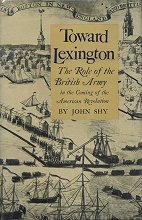
SHY : Toward Lexington (fülszöveg)
The complicated relationship between armed force and political control in British North America before the outbreak of the Revolutionary War is the primary concern of this book. The first British Empire was not ruled through coercion, and colonial Americans were expected to do their own fighting. But prolonged war with France eventually broke down traditional military policy and led to the introduction of a sizable army of British regulars into America after the French and Indian War.
The British decision of 1763 to keep an army in the colonies is carefully reexamined and its direct consequences traced by Professor Shy along three parallel lines down to the outbreak of war in 1775: (1) British military policy—shifting, vacillating, economizing, never clear as to what the army was supposed to do in the colonies; (2) the colonial response to the army—more moderate and pragmatic than one would have guessed; and (3) the army itself—a European institution designed for war, trying to meet unprecedented demands of peacetime America.
The army played some part in all of the well-known crises of the pre-Revolutionary decade, yet it also had a routine existence in the midst of colonial society. Set apart by its special capacity to use violence, and by its costliness to the government, this group of men constantly found itself engaged on two fronts: with its civilian neighbors in America, and with its official superiors in England. Its story is the coming of the Revolution in microcosm.
Based on research in British and American printed and manuscript sources, the book clarifies a number of points of controversy and uncertainty, though it offers no startlingly new explanation of the Revolution. Instead, it deepens our understanding of how men on both sides of the Atlantic came to see treason and bloodshed as unavoidable.